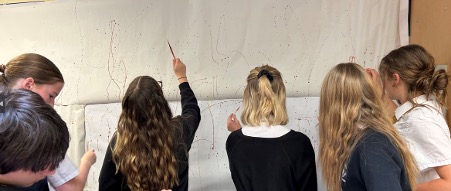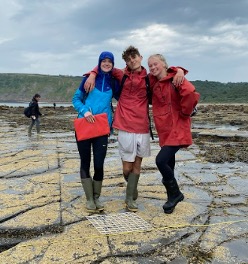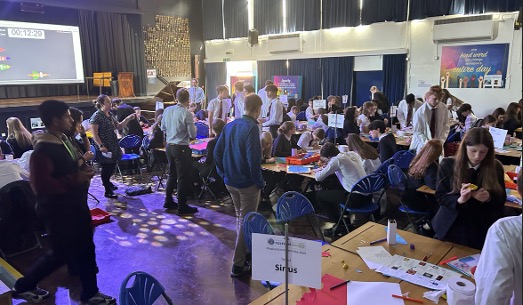Science
 Curriculum Leader: Mrs K Stabler
Curriculum Leader: Mrs K Stabler
We have an ambitious, hardworking and enthusiastic science department.
The Science department consists of a team of 12 full time teachers, 2 part time teachers and 5 technicians. Where possible, staff teach predominantly according to their specialism at GCSE and A -Level. They teach all three sciences in Years 7-8. Each teacher brings their own interests and experience to provide a rich and varied experience for our students.
The department has 14 laboratories, including 4 new Physics labs and 5 preparation rooms. Each laboratory has a networked computer and an interactive smartboard. In addition, one laboratory has 20 networked computers together with a large collection of data logging equipment.
Curriculum intent
Fulford science department “Developing the next generation of super scientists”
We want our science students to look to the future, to see how science can change the world we live in for the better. We want to ensure our curriculum is accessible, and engages all students and prepares them with the skills and the knowledge to be successful in the future, and go on to destinations that meet their interests and aspirations. To further develop student’s passion for science, we organise many enrichment opportunities in and out of school to expand their interest in science outside the classroom.

The aim of our curriculum is to successfully interleave the delivery of substantive and disciplinary knowledge and ensure there are frequent opportunities to build connections between concepts and skills. Substantive knowledge is organised around key scientific pillars and is sequenced to revisit these through the curriculum. Disciplinary knowledge advances through the curriculum (for example structures around drawing of graphs in Year 7, 8 and 9).
The department currently follows its own scheme of learning which integrates the development of substantive and disciplinary knowledge. In Year 7 students are taught in mixed ability groups.
Summary of Curriculum Content
At Fulford each lesson is attributed to a pillar of knowledge.
The Pillars of Knowledge for Biology are:
- Cells
- Organ Systems
- Genetics and Evolution
- Biological molecules
- Plant Biology
The Pillars of Knowledge for Physics are:
- Forces and Motion
- Electricity and Magnetism
- Waves
- Matter
The Pillars of Knowledge for Chemistry are:
- Matter
- Reactions
- Energy
- Earth
Our key pillars for disciplinary knowledge are:
- Planning
- Experimental skills
- Analysis
- Conclusions and Limitations
- Evaluating
Topics are introduced in Year 7 and then expanded in more detail in year 8. Our Year 9 curriculum aims to introduce early ideas from the KS4 syllabus. In Year 7, 8 and 9. We have developed key terms to go with each topic, to help students learn the key scientific language. We have also put together a list of videos and exam questions to support every student – we call this the SLIC (Student Learning Independent Cycle) work.
- Y7 Key terms
- Y8 Key terms
- Y9 Key terms
- Y7 SLIC work
- Y8 SLIC work
- 25-26 Science Curriculum Overview Calendar
- 25-26 Science Assessment Calendar
- Biology Year 9 EOY TEST SLIC
- Chemistry SLIC Y9 EOY test
- Physics SLiC Year 9 Test 3 EOY
Alongside our substantive knowledge, students study a range of ‘core practicals,’ in similar vein to the required practicals at GCSE level.
At Key Stage 4 pupils can follow a variety of paths. Assessment information is used to inform a decision about which students would benefit from taking AQA Separate Sciences (usually 3 groups) whilst others take AQA Combined Science (usually 6 groups).
In Year 10 and 11 most students have 8 and 10 hours of teaching per fortnight. We have developed key terms to go with each topic, to help students learn the key scientific language. We have also put together a list of videos and exam questions to support every student – we call this the SLIC (Student Learning Independent Cycle) work.
Further details such as summary sheets, self-assessment sheets, past papers and relevant syllabi can be found for each topic on the appropriate section of the school VLE.
Relevant subject links are:
Science courses are popular at A- Level and this is reflected in the high number of students taking the subjects. We currently have the following groups:
Y12 Biology | 2 Groups | Y13 Biology | 2 Groups |
Y12 Chemistry | 2 Groups | Y13 Chemistry | 2 Groups |
Y12 Physics | 2 Groups | Y13 Physics | 2 Groups |
BTEC Applied Science | 1 Group | BTEC Applied Science | 1 Group |
BTEC Forensics | 1 Group | BTEC Forensics | 1 Group |
All three Sciences follow AQA specifications at present. At both Year 12 and Year 13 the groups receive 9 hours teaching time each fortnight. We also run popular KS5 level 3 BTEC courses in Applied Science and Forensics.
Please note that the Biology field trip will take place in July 2024 inclusive. This residential field trip is a requirement of studying A level Biology.
Curriculum Maps for KS5
- A Level Biology Curriculum map
- A Level Chemistry Curriculum map 2025-26
- A-Level Physics Y12 curriculum map 2025 – 26
- A-Level Physics Y13 curriculum map 2025 – 26
- KS5 Assessment calendar 2025-26 Physics
- BTEC Applied Science Curriculum Map
Summary of Curriculum Content
Links to the relevant syllabi and past papers are found at:
A Level Chemistry Assessment Calendar 25-26
KS5 Biology Assessment calendar 2025-2026
The Science department enter many competitions like the Faraday Challenges and the Physics Olympics at KS3.

We go on many trips including the Yorkshire Wildlife Park, and the Astro-campus. To further develop student’s passion for science, we organise many enrichment opportunities in and out of school to expand their interest in science outside the classroom.


We have a stem club for KS3, we have a science week and we have a space enrichment day for our Physics KS4 students. At KS5 Biology, Chemistry and Physics students enter the Olympiad competition. The Biology department run a very successful Biology Field trip.

- Mrs Stabler : Curriculum Leader of Science
- Mrs Hickson: Curriculum Leader of Biology
- Mr James West : Curriculum Leader of Chemistry
- Mr Borwell : Curriculum Leader of Physics
- Mr Bailey : Assistant Head Teacher
- Mr Carson: Progress Leader of KS4
- Miss E Surplice – Science Teacher
- Dr Fogg : Science Teacher
- Mr Gray : Head of Year 13
- Dr Williams : ITT co- Ordinator
- Mr Bonsels: Head of year 10
- Mr Hayden : Head of BTEC
- Mr Lynn : Pupil Premium Lead
- Dr Real : Science Teacher
- Mrs Allsop: Senior Science Technician
- Mr Cockburn: Biology Technician
- Mrs Gill: Biology Technician
- Mr Allsop: Chemistry Technician
- Mrs Staincliffe: Physics Technician
